New normal life in outbreak
Beijingers adapt to stricter epidemic control measures
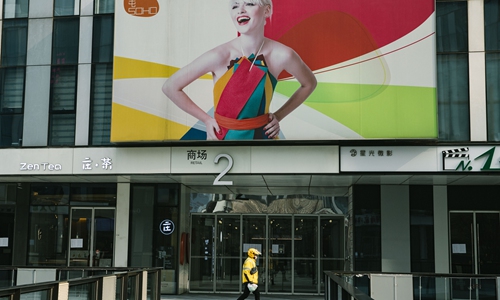
A delivery man walks by a building in the downtown Sanlitun shopping area in Beijing on Wednesday, the third day the city officially resumes work. As most companies and government institutes decided to let employees work from home during the epidemic, few people can be seen in Sanlitun, which is one of the city's busiest districts. Photo: Li Hao/GT
A Beijing South Railway Station employee disinfects ticket-vending machines on Thursday to ensure the safety of passengers amid the outbreak of the novel coronavirus. Facilities at the railway station, including infrared thermometer, are set to monitor passengers' temperatures. Photo: Xinhua
Chinese people are wondering how much longer they have to wait before the empty stores and streets in Beijing return fully-packed, as the spread of the novel coronavirus has now made the capital city of more than 20 million population look like a deserted town in Europe.
While more people have returned to work this week, they are getting used to this "new normal" as life becomes vastly different amid the outbreak and many have no choice but to adapt to it and move on.
After 14-days of quarantine at home, Simon, a 34-year-old white collar worker who came back from his hometown in Central China's Hubei Province - the epicenter of the COVID-19, said he could not wait any longer to get back to work. "I miss those days when I worked late into the night at the office, ordered coffee with my colleagues and took a walk outside the office building during lunch break," he told the Global Times on Wednesday.
Those little things in life quietly change inadvertently, which make people realize how precious they are, he said.
Monday was the first day of work and Simon was finally out of self-quarantine. "When I drove on the fourth-ring road, there were no traffic jams. Usually it takes more than an hour to drive from home to work, now only 20 minutes," he said. "Even if it's cold outside, I'd roll down the window when I drive as it's the smell of freedom."
Megacities like Beijing and Shanghai have recently imposed strict measures as people going back to their hometown for Spring Festival holidays are coming back for work and the cities face mounting pressures to contain the virus. For instance, Beijing ordered to close entertainment venues and other public places deemed low necessity on Tuesday, and some residential communities limit access for non-residents and more coronavirus controls have been imposed such as mandatory mask wearing.
Jun Yixiao, a young beipiao, literarily meaning "Beijing drifter", who comes from East China's Jiangsu Province, lives in a community in the Chaoyang district. After spending days working from home as part of the self-quarantine measures, she began walking to the office in recent days.
Life appeared to return to normal but it is not completely the same she said.
The hair salon nearby has postponed business resumption without a definite date to reopen, and her gym has also launched measures to curb the novel coronavirus spreading. She noted that a local gym named Youngs had informed her that it required all members to make appointments one day beforehand and wear masks in the gym.
Gym staff will also check the gym goers' temperatures before letting them in and spend 30 minutes to disinfect and ventilate between every two classes.
Some vegetable, fruit shops and convenience stores have reopened but cutting business hours. Restaurant businesses are reeling as local authorities urge the public not to gather in crowded places. Jun said she received an entry-exit permit from the community management committee in her residential area, as the residential area now adopted 'seal-off' management measures to limit people going in and out.
"I was told to keep the permit, a small piece of paper, properly as it may be in use for a long time," she said, noting that couriers are not allowed into the residential area anymore.
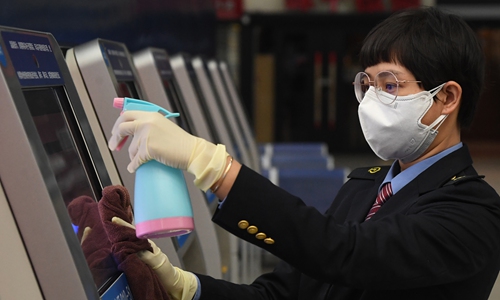
Work and health balance
Authorities have been coming up with a series of new measures to ensure the resumption of work following the extended Spring Festival holidays amid the outbreak, striking a balance between maintaining economic growth and containing the viral spread.
Ordinary workers in Beijing have also been trying to get their lives back on the normal track, especially those in services sector.
Every day after dinner, a Beijing taxi driver surnamed Zhao in his late 50s would wear a black hat, black goggles and a brown gas mask with two filters and a pair of white gloves before leaving his home in Tongzhou district to start work.
The way he dressed reminded some passengers of radical protesters in Hong Kong, who fully geared up in such way, but for a completely different purpose.
The middle-aged man disinfects the interior of his car almost 10 times a day by spraying sanitizer, usually before each customer gets in the car. "I have to protect my customers and myself from being infected," he explained.
All the protective outfits Zhao uses every day are prepared by his wife, who tried to talk him out of working these days as she worried so much about him at such a critical moment of fighting the disease, but Zhao refused to do so as he had to earn money to support the family.
To pacify his wife, Zhao has been working every day but only at night since late January, as "there are usually less people outside at night and less possibility of getting infected," he said.
"I was a taxi driver during the SARS outbreak, and I was okay at that time with almost no protective measures taken, and I am sure I will also survive this time," Zhao said.
He said he is also a husband and a father, and has to shoulder the responsibility of protecting the family. The first thing he does when he comes back home is spraying ethanol on his jacket and outfits and leave them in the hallway for ventilation.
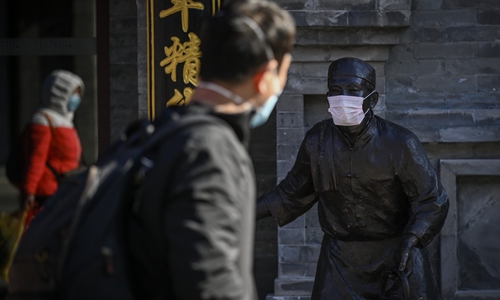
A bronze statue (R) wearing a face mask is seen at the entrance of a shop along a business street in Beijing on Tuesday. Beijing has reported 228 confirmed novel coronavirus cases as of Tuesday. Photo: AFP
A sanitation worker sprays disinfectant in a public area in Beijing on Tuesday. Photo: cnsphoto
Jack, a 24-year-old expat residing in Beijing has decided to stay in China since the outbreak. He said that he didn't want to return to Australia, his home country, as he feared it would bring unnecessary trouble for his wife, family and workplace.
"The Australian Embassy informed me to leave China immediately however I didn't heed such advice. I don't want to further inconvenience my wife and daughter whom are Chinese nationals, and also my employer," he told the Global Times.
He described his own method of preventing infection as he often is given the household task of grocery shopping. "I don my face mask, sunglasses and bring used grocery bags and tissues to cover my hands. I make sure that I don't touch anything directly as I have an 18-month-old baby at home. I want to be extra careful that she doesn't become sick," said Jack.
Jack has felt lucky that he has been able to mostly work from home during the outbreak and feels that this has contributed to alleviating fears for family members, both in China and Australia who are monitoring the situation closely. "It's an inconvenience but we are coping well and willing to weather the storm of the virus together with the Chinese people."
A possible new outbreak of the highly contagious disease, especially new infections in the capital city continue increasing, this has made people highly alert, even sometimes neurotic. A young woman who always dresses up in a fashionable way while carrying luxury handbags like Chanel, living in Chaoyang district, said she would never think of being treated in a discriminatory way in the city where she has been living for decades.
"I went to a convenience store one day near my home, and I tried to pick up a bunch of grapes, but suddenly I heard a woman screaming at the retailer," she said.
As the woman was also about to buy the grapes, she angrily told the retailer "look at this lady who just touched the grapes without wearing gloves, I don't want it anymore."
Supplies such as gloves, masks, and disinfectants have become daily necessities these days for ordinary Chinese people.
"If I was treated like this, how people from Wuhan would be treated?" she said.
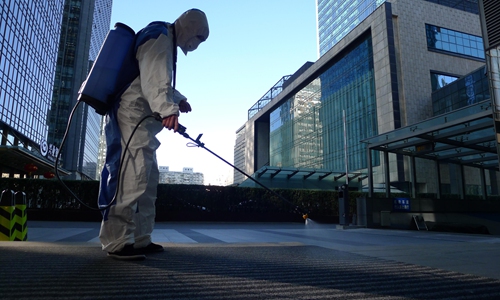
New lifestyle
Wearing pajamas with no makeup, having a conference call when trying to take care of a baby who constantly cries, keeping a naughty boy far away from her laptop, cooking dinner while responding to colleagues' instant messages… working mothers in Beijing are now trying to accommodate to this "new normal" as the outbreak has forced many to work from home, at the same time, take care of their children.
Without the help of the babysitter, who has to stay at her village due to a rural lockdown amid the outbreak, a mom of a 10-month-old baby, who works in the media industry, told the Global Times sometimes she has to use bathroom breaks to caress her child and the busy dual work has worn her out.
She told the Global Times that a former babysitter quit after the outbreak started, which forced her to face extra pressure handling work and child care, especially in the days when she had to go to the office and her mother was left alone taking care of her son.
She had already hired a new babysitter after she interviewed a smaller pool of candidates in the nanny industry. But the new one lives in a village in North China's Hebei Province and could not come to Beijing due to the lockdown and the suspension of interprovincial buses.
'C'est la vie'
Sharing apartments form a common lifestyle amongst many young people living in Beijing. The coronavirus outbreak obviously has left those people in a dilemma.
Since coming back to Beijing after the Spring Festival holidays, Li Xue has been staying in her home for a week. Li is not allowed to go out of her community until she quarantines herself at home for two weeks. But Li doesn't feel easy at home, apart from dealing with jobs at home, another reason is because she shares the apartment with two other girls.
"We haven't talked to each other face to face for days. Who knows what kind of people she meets on her way to work and what place she goes to each day! I also have to sterilize the kitchen and toilet with alcohol to maintain the hygiene of the public area," Li said.
Amid the coronavirus outbreak, her community is locked down. Only one person from each household is allowed to go out every day. Li said she has to get an entry permit by showing her tenant contract to the property management office.
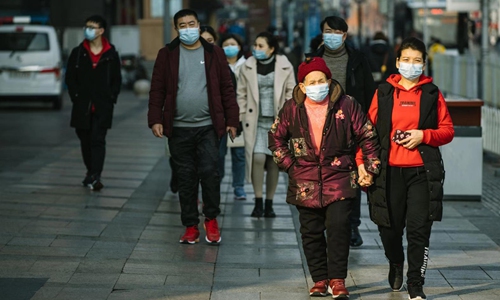
Visitors wearing masks walk along Wangfujing Street in Beijing on January 25 amid the outbreak of novel coronavirus in Wuhan. Photo: Li Hao/GT
Some grass-root volunteers in a residential community in Chaoyang district of Beijing said that the city started to promote the use of resident ID card to strictly monitor flowing populations.
A retired granny in her 60s Surnamed Zhang, who signed up with the neighborhood committee of Yanjingli community and became a grass-roots volunteer monitoring the flow of people at a temporary office space at the entrance of her community after the coronavirus outbreak began, introduced some details about community protection works to the Global Times on Monday.
There are two kinds of resident ID cards, the yellow one is for apartment owners registered with the neighborhood committee and the white one is for those floating around and short-term renters who were registered with volunteers and confirmed healthy, she said.
Community service phone numbers are also printed on the resident card, with words stating "Everyone has a responsibility to prevent and control the epidemic."
According to Granny Zhang, the local government did not give face masks to volunteers,due to its scarcity. They are asked to bring masks and other protective equipment of their own, using their own masks can also prevent accidental infection between volunteers.
A nearby community was gated with an electric barrier to stop people entering randomly. Residents were required to walk to the gate if they want to pick up take-out food and express deliveries.
Life is becoming more challenging amid the outbreak, as we need to deal with more uncertainties, take care of our families and properly handle work, sometimes, we worry about whether we would become infected, a mother of two kids who lives in Chaoyang district told the Global Times.
Work from home is not always easy, when she sometimes has meetings with her colleagues, her two children cried one after another. "I don't have much time to rest. Besides work and child care, I have to cook. I asked the babysitter whether she could come back soon recently, but she said the village bans them from leaving," she said.
"But life has to move on. C'est la vie."